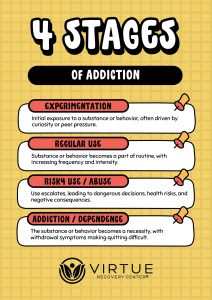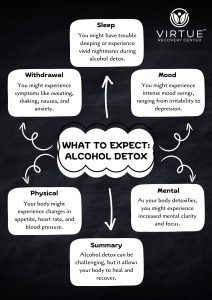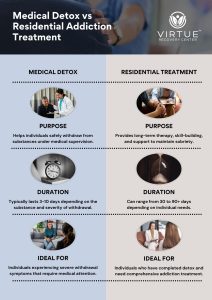Cognitive-behavioral therapy (CBT) is a widely recognized and highly effective form of therapy that has applications in multiple fields of the mental health profession. CBT is often employed in substance use disorder treatment to address underlying behavioral patterns and thought processes that may contribute to addiction. Examples of cognitive-behavioral therapy can help you learn more about this treatment and how it might benefit your recovery.
At Virtue Recovery Las Vegas, we understand that addiction is a complex condition that requires personalized, evidence-based treatment approaches. Our team of experts is well-versed in cognitive-behavioral therapy and other forms of addiction treatment. We can work with you to develop a personalized treatment plan for your unique needs.
Contact us today at 866.520.2861 to learn more about our programs and services. We’re ready to help you take the first step toward a successful recovery.
What Is Cognitive-Behavioral Therapy?
CBT is a type of psychotherapy grounded in the idea that our thoughts, actions, and emotions are interconnected. Negative thought patterns can exacerbate emotional distress and unhelpful behaviors. In substance use disorder treatment, clients struggling with addiction often have underlying mental health issues contributing to their drug or alcohol use, such as anxiety or depression. CBT helps clients to identify and challenge negative thought patterns and develop positive coping mechanisms that are more sustainable and effective.
Examples of Cognitive-Behavioral Therapy
One of the most common cognitive-behavioral therapy examples is the ABC model. This model helps individuals identify and understand the link between their thoughts, feelings, and behaviors. The ABC model consists of three parts:
- A: Activating Event – The event or situation that triggered the individual’s emotional response
- B: Belief System – The individual’s automatic thoughts or beliefs about the activating event
- C: Consequence – The emotional and behavioral response to the activating event
For example, if an individual experiences a trigger that reminds them of past substance use, the activating event (A) can be the person or situation that triggered their urge to use. Their belief system (B) could be “I can’t resist the urge to use” or “I need alcohol/drugs to cope with stress.” The consequence (C) could be that the individual relapses and returns to using substances.
CBT Example in Substance Use Disorder Treatment
CBT can be applied in various ways to treat substance use disorders. One CBT example is relapse prevention therapy. This therapy involves identifying high-risk situations and teaching individuals how to cope without using substances. CBT techniques used in relapse prevention therapy include:
- Identifying and challenging irrational beliefs that contribute to substance use
- Creating a plan for coping with high-risk situations such as social gatherings or stress
- Practicing relaxation techniques such as deep breathing or meditation to manage stress
- Developing problem-solving skills to deal with difficult situations
Another example of CBT for substance use disorders is the Matrix Model. This is a 16-week treatment program that combines CBT with other therapies, such as family therapy and 12-step facilitation. The Matrix Model aims to help individuals achieve abstinence and maintain sobriety by addressing various aspects of their addiction. It educates participants about addiction, relapse prevention strategies, coping skills, and social support.
Use CBT to Recover at Virtue Recovery Las Vegas – Substance Use Disorders
Cognitive-behavioral therapy is highly effective for treating mental health concerns, including substance use disorders. If you or someone you know is struggling with a substance use disorder, please get in touch with Virtue Recovery Las Vegas. Our team of substance use disorder treatment experts offers specialized programs and services for individuals struggling with addiction. Contact us at 866.520.2861 or online today, and let us help you on your journey toward recovery.













